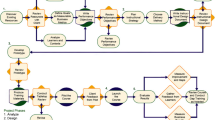Abstract
Aim
In a problem-based learning (PBL) curriculum, tutor’s feedback skills are important. However, evaluation studies often show that students rate many tutors as ineffective in providing feedback. We explored whether this is related: (a) to tutors’ skills, and hence a teaching intervention might improve their performance; (b) to the formulation of the evaluation item, hence a more specific wording might help students better recognize a feedback when received; (c) to PBL teaching environment, and hence the tutors’ teaching unit might influence students’ ratings.
Methods
Students rated 126 tutors of 13 one-month teaching units over three consecutive years on their ability of providing feedback. We assessed how (a) a teaching intervention given between years 1 and 2, (b) a rewording of the evaluation item which took place in year 3, and (c) the tutors’ teaching unit, influenced students’ ratings.
Results
The ratings of tutors considered as effective by students at year 1 improved after the teaching intervention, while those of unsatisfactory tutors did not progress. However the ratings of the latter increased after reformulation of the evaluation item. This increase varied across teaching units.
Discussion
Students’ ratings of tutors’ ability to give feedback seem to vary in function of the tutors’␣training, of the formulation of the evaluation item, and of the tutors’ teaching environment. These variables should be considered for setting up effective strategies in faculty development.
Similar content being viewed by others
References
Baroffio A., Kayser B., Vermeulen B., Jacquet J., Vu N.V. (1999). Improvement of tutorial skills: an effect of workshops or experience? Academic Medicine 74:S75–S77
Baroffio, A., Nendaz, M.R., Perrier, A., Layat, C., Vermeulen, B. & Vu, N.V. (2006). Effect of teaching context and tutor workshop on tutorial skills. Medical Teacher 28 (in press)
Barratt M.S., Moyer V.A. (2004). Effect of a teaching skills program on faculty skills and confidence. Ambul Pediatr 4(1 Suppl):117–120
Bing-You R.G., Bertsch T., Thompson J.A. (1998). Coaching medical students in receiving effective feedback. Teaching and Learning in Medicine 10:228–231
Blair G.M., Jones R.S., Simpson R.H. (1968). Educational Psychology. Macmillan, New York
Branch, W.T. & Paranjape, A. (2002). Feedback and reflection: teaching methods for clinical settings. Academic Medicine 77: 1185–1188
Dolmans, D.H., Wolfhagen I.H., Schmidt H.G. & van der Vleuten, C.P. (1994). A rating scale for tutor evaluation in a problem-based curriculum: validity and reliability. Medical Education 28(6): 550–558
Ende J. (1983). Feedback in clinical medical education. Jounal of the American Medical Association 250:777–781
Eva K.W., Cunnington J.P.W., Reiter H.I., Keane D.R., Norman G.R. (2004) How can I know what I don’t know? Poor self assessment in a well-defined domain. Advances in Health Sciences Education 9:211–224
Gil D., Heins M., Jones P.B. (1984). Perceptions of medical school faculty members and students on clinical clerkship feedback. Journal of Medical Education 59:856–864
Hewson M.G., Little M.L. (1998). Giving feedback in medical education. Verification of recommended techniques. Journal of General Internal Medicine 13(2):142–143
Irby D., Rakestraw P. (1981). Evaluating clinical teaching in medicine. Journal of Medical Education 56(3):181–186
Kaprielian V.S., Gradison M. (1998). Effective use of feedback. Family Medicine 30:406–407
Kogan J.R., Bellini L.M., Shea J.A. (2000) Have you had your feedback today? Academic Medicine 75:1041
Kruger J., Dunning D. (1999). Unskilled and unaware of it: how difficulties in recognizing one’s own incompetence lead to inflated self-assessments. Journal of Personality and Social Psychology 77:1121–1134
Litzelman D.K., Stratos G.A., Marriott D.J., Lazaridis E.N., Skeff K.M. (1998). Beneficial and harmful effects of augmented feedback on physicians’ clinical-teaching performance. Academic Medicine 73(3):324–332
Parikh A., McReelis K., Hodges B. (2001). Student feedback in problem based learning: a survey of 103 final year students across five Ontario medical schools. Medical Education 35:632–636
Paukert, J.L., Richards, M.L. & Olney, C. (2002). An encounter card system for increasing feedback to students. American Journal of Surgery 183(3): 300–304
Sachdeva, A.K. (1996). Use of effective feedback to facilitate adult learning. Journal of Cancer Education 11(2): 106–118
Salerno S.M., O’Malley P.G., Pangaro L.N., Wheeler G.A., Moores L.K., Jackson J.L. (2002). Faculty development seminars based on the one-minute preceptor improve feedback in the ambulatory setting. Journal of General Internal Medicine 17:779–787
Schum, T.R. & Krippendorf, R.L. (2000). Feedback notes: a system for feedback to students and residents. Academic Medicine 75(5): 556–557
Stone S., Mazor K., Devaney-O’Neil S., Starr S., Ferguson W., Wellman S., Jacobson E., Hatem D.S., Quirk M. (2003) Development and implementation of an objective structured teaching exercise (OSTE) to evaluate improvement in feedback skills following a faculty development workshop. Teaching and Learning in Medicine 15 (1):7–13
Vu N.V., Bader C.R., Vassalli J.D. (1997). The redesigned undergraduate medical curriculum at the University of Geneva. In: Scherpbier AJJA, van der Vleuten CPM, Rethans J.J., van der Steg A.F.W. (eds). Advances in Medical Education. Kluwer Acad. Publ., Dordrecht, pp. 532–535
Wood B.P. (2000). Feedback: a key feature of medical training. Radiology 215:17–19
Author information
Authors and Affiliations
Corresponding author
Rights and permissions
About this article
Cite this article
Baroffio, A., Nendaz, M.R., Perrier, A. et al. Tutor Training, Evaluation Criteria and Teaching Environment Influence Students’ Ratings of Tutor Feedback in Problem-Based Learning. Adv in Health Sci Educ 12, 427–439 (2007). https://doi.org/10.1007/s10459-006-9008-4
Received:
Accepted:
Published:
Issue Date:
DOI: https://doi.org/10.1007/s10459-006-9008-4




